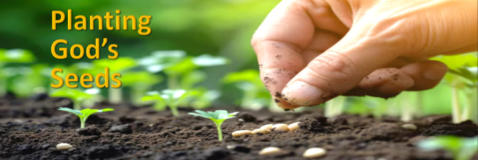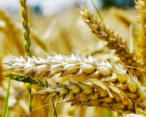
Introduction
To
support
human
life,
God
not
only
designed
a
diverse
range
of
plants,
He
also
provided
a
means
for
them to reproduce and populate the earth by causing them to generate seeds.
“Then
God
said,
‘Let
the
earth
bring
forth
grass,
the
herb
that
yields
seed,
and
th
e
fruit
tree
that
yields
fruit
according
to
its
kind,
whose
seed
is
in
itself,
on
the
earth’;
and
it
was
so.
And
the
earth
brought
forth
grass,
the
herb
that
yields
seed
according
to
its
kind,
and
the
tree
that
yields
fruit,
whose
seed
is
in
itself
according
to
its
kind.
And
God
saw
that
it
was
good.
So
the
evening
and
the
morning
were
the
third
day.”
Genesis 1:11-13
Seed-bearing plants:
•
Are the most diverse and widespread group in the plant kingdom.
•
Have successfully populated the earth—from deserts to rainforests.
•
Fundamentally support human life by being the main source of the:
o
Oxygen we breath (via conversion of carbon dioxide into oxygen).
o
Food we eat (wheat, rice, corn, fruits, vegetables, nuts, and so forth).
•
Produce seeds that:
o
Range in quantity from hundreds to thousands.
o
Utilize various mechanisms for seed dispersal: wind, water and animals.
o
Are
able
to
remain
dormant
for
long
periods
of
time
and
will
germinate
when
conditions are right.
•
May exponentially reproduce (the rate of growth increases as quantity grows).
Spiritual Relevance
Jesus
referenced
the
planting
of
seeds
multiple
times
to
explain
spiritual
truths—which
seems
appropriate—because
the
One
who
introduced
plants
on
the
third
day
of
earth’s
creation,
planned
to
implement
a
similar
means
to
expand
and
populate
His
Heavenly
Kingdom
by
casting
His
word
as
“seeds”
that
would
land
upon
and
enter
humans
(via
eyes
and
ears),
germinate
within
the
heart
and
soul,
and
transform
them
so
that
they
may
spread
His
word
as
seeds
to
others.
For
Jesus
declared,
“The seed is the word of God.”
Luke 8:11
When
you
think
about
it,
Christians
are
like
seed-bearing
plants.
Everything
we
say
and
do
has
the
potential
of
landing
upon
and
influencing
others.
In
addition
to
sharing
and
teaching
God’s
word,
examples of our seed casting activities include how we express:
•
Faith in difficult times.
•
Joy when negative emotions are expected.
•
Kindness with those who are undeserving.
•
Love when others assume different types of hatred will be exhibited.
•
Hope when things seem hopeless.
•
Forgiveness for those who are unforgivable.
In
addition,
it
is
important
to
recognize
those
who
publicly
claim
to
be
a
Christian
are
viewed
by
non-
Christians with a critical eye for one of two purposes—for they are:
•
Looking for hypocritical behavior as a reason to reject God and justify their sin.
•
Seeking the existence of God and His transformative truths in the lives of others.
Therefore,
“Let
us
not
love
in
word
or
in
tongue,
but
in
deed
and
in
truth.”
1
John
3:18
And,
“Be
doers
of the word, and not hearers only.”
James 1:22
For
we
are
God’s
fellow
workers
and
instruments
of
God’s
Love
as
we
obediently
plant,
water,
and
harvest
(assist
in
the
transformational
born
again
experience)
for
God’s
Kingdom.
Plus,
it
is
a
wonderful
blessing
to
plant
seeds,
water
them
and
facilitate
the
harvest.
However,
one
may
plant,
another
may
water,
and
someone
else
may
harvest.
But
it
is
God
(via
the
Holy
Spirit)
who
is
directly
involved and responsible for all! (
1 Cor. 3:5-9; 2 Cor. 9:10
)
Jesus
also
provided
us
with
a
parable
that
provides
spiritual
insight
by
comparing
4
different
soil
conditions
a
seed
may
land
upon—which
correlates
to
the
spiritual
condition
of
the
recipient
of
God’s
seed. (
Mat. 13:1-23; Mark 4:1-20; Luke 8:4-15
)
It
is
important
to
note
that
it
is
possible
for
a
seed
to
land
upon
the
wayside
and
remain
dormant
(God’s
word
remains
within
the
heart
and
memory
but
has
not
germinated)—but
the
seed
eventually
moves
to
good
ground
(by
various
means),
germinates
and
produces
fruit
for
God’s
glory.
This
scenario
describes
me
when
I
first
heard
the
Gospel
of
Jesus
Christ.
I
rejected
His
truths
and
continued
to
live
in
darkness
and
sin.
Later
I
encountered
other
persons
who
watered.
But
I
continued
in
my
destructive
path
because
I
was
deceived
by
Satan’s
lies.
Years
later
I
was
at
the
“end
of
my
rope”
and
facing
dire
consequences
for
my
behavior.
The
soil
was
fully
prepared
for
the
seed
of
God’s
word
and
His
truths
to
take
root
in
my
heart
and
grow.
I
vividly
remember
when
the
words
of
Jesus
in
Revelation
3:20
spoke
directly
to
me.
“I
stand
at
your
door
and
knock.
Open
the
door
so
that
I
can
enter
and
dine
with
you,
and
you
with
Me.”
A
couple
of
days
later
I
was
sitting
in
the
back
row
of
a
Christian
church,
and
the
pastor
asked
if
anyone
wanted
to
accept
Jesus
as
their
Savior
and
Lord.
I
remember
my
mind
filling
with
reasons
not
to
go
forward—but
then
realized
this
was
Satan
who
was
unwilling
to
relinquish
control.
I
got
up,
walked
forward
and
stood
before
the
pastor
crying
deep
tears
as
I
declared
my
belief
in
Jesus
and
my
desire
to
accept
Him
as
Lord
over
my
life.
Looking
back...it
was
all
directed
by
the
Holy
Spirit—because
of
the
events
in
my
life
that
caused
me
to
turn
towards
God,
and
through
those
who planted and watered the seed of God’s word within me.
The Power of God’s Word
God’s word:
•
Operates within the spiritual realm:
o
“For
the
word
of
God
is
living
and
powerful,
and
sharper
than
any
two-edged
sword,
piercing
even
to
the
division
of
soul
and
spirit,
and
of
joints
and
marrow,
and
is
a
discerner
of
the
thoughts
and intents of the heart.”
Hebrews 4:12
o
“The words that I speak to you are spirit, and they are life.”
John 6:63
•
Has
an
intended
purpose:
“So
shall
My
word
be
that
goes
forth
from
My
mouth;
it
shall
not
return
to
Me
void,
but
it
shall
accomplish
what
I
please,
and
it
shall
prosper
in
the
thing
for
which
I
sent
it.”
Isaiah 55:11
o
Is
the
source
of
guidance
for
those
who
accept
Jesus:
“All
Scripture
is
given
by
inspiration
of
God,
and
is
profitable
for
doctrine,
for
reproof,
for
correction,
for
instruction
in
righteousness,
that
the man of God may be complete, thoroughly equipped for every good work.”
2 Timothy 3:16-17
o
Will
condemn
those
who
reject
Jesus:
“He
who
rejects
Me,
and
does
not
receive
My
words,
has
that which judges him—the word that I have spoken will judge him in the last day.”
John 12:48
Planting the Seeds of God’s Word
Here are important things to remember when you share God’s word:
•
You are being viewed with a critical eye that is looking for hypocrisy and/or truth.
•
Evaluate
the
attitude
of
your
heart
and
make
sure
you
share
Jesus
in
the
Spirit
of
God’s
grace
and
His love.
•
Never
speak
words
that
may
convey
your
judgment
or
condemnation
(only
God
has
the
right
to
judge).
•
“Avoid
foolish
and
ignorant
disputes,
knowing
that
they
generate
strife.
And
a
servant
of
the
Lord
must
not
quarrel
but
be
gentle
to
all,
able
to
teach,
patient,
in
humility
correcting
those
who
are
in
opposition,
if
God
perhaps
will
grant
them
repentance,
so
that
they
may
know
the
truth,
and
that
they
may
come
to
their
senses
and
escape
the
snare
of
the
devil,
having
been
taken
captive
by
him
to do his will.”
2 Tim. 2:23-26
•
You
may
encounter
an
objection
expressed
in
various
ways
and
forms.
These
are
not
targeted
at
you,
but
are
the
consequences
of
darkness,
sin
and
lies.
As
such,
“Forgive
them,
for
they
do
not
know what they do.”
Luke 23:34
•
Share the 4 spiritual truths:
1
.
God loves us
and desires a relationship with us.
2
.
We are all sinners
—which separates us from a relationship with God.
3
.
God crucified His Son
, Jesus Christ, so that we may be forgiven for our sins.
4
.
We must believe
in what Jesus did for us on the cross to receive
God’s grace and eternal life.
For more info read “4 Spiritual Truths” on UniqueBibleStudies.com
•
Recognize our human intellect and pseudo “wisdom” is ineffective in the spiritual realm.
•
Pray and ask the Holy Spirit for help.
•
Remember:
o
God’s word will pass through listening barriers and reach the depths of the heart and soul.
o
It is the Holy Spirit who s
aves a person and not us. We are simply God’s “farmers.”
“Therefore,
my
beloved
brethren,
be
steadfast,
immovable,
always
abounding
in
the
work
of
the
Lord,
knowing that your labor is not in vain in the Lord.”
1 Cor. 15:58
“Therefore
be
patient,
brethren,
until
the
coming
of
the
Lord.
See
how
the
farmer
waits
for
the
precious
fruit
of
the
earth,
waiting
patiently
for
it
until
it
receives
the
early
and
latter
rain.
You
also
be
patient.
Establish your hearts, for the coming of the Lord is at hand.”
James 5:7-12
“The
harvest
truly
is
great,
but
the
laborers
are
few;
therefore
pray
the
Lord
of
the
harvest
to
send
out
laborers into His harvest.”
Luke 10:2
“Do
you
not
say,
‘There
are
still
four
months
and
then
comes
the
harvest’?
Behold,
I
say
to
you,
lift
up
your
eyes
and
look
at
the
fields,
for
they
are
already
white
for
harvest!
And
he
who
reaps
receives
wages,
and
gathers
fruit
for
eternal
life,
that
both
he
who
sows
and
he
who
reaps
may
rejoice
together.
For
in
this
the
saying
is
true:
‘One
sows
and
another
reaps.’
I
sent
you
to
reap
that
for
which
you
have
not labored; others have labored, and you have entered into their labors.”
John 4:35-38
We Serve A Wonderful God—With Whom We Will Spend Eternity!
Harold D. Thomas
Thought Provoking Questions
The
purpose
of
the
questions
is
to
facilitate
a
deeper
understanding
of
the
Bible,
this
Bible
study
topic,
and
ourselves.
The
questions
may
be
answered
by
each
reader,
or
used
by
a
Bible
study
group
leader
or church pastor.
The
questions
are
designed
to
enhance
learning
by
discovering
and
solidifying
personal
beliefs
and
opinions. As such, no answers are provided.
First read the following scripture:
The Parable of the Wheat and the Tares
“Another
parable
He
put
forth
to
them,
saying:
‘The
kingdom
of
heaven
is
like
a
man
who
sowed
good
seed
in
his
field;
but
while
men
slept,
his
enemy
came
and
sowed
tares
among
the
wheat
and
went
his
way.
But
when
the
grain
had
sprouted
and
produced
a
crop,
then
the
tares
also
appeared.
So
the
servants
of
the
owner
came
and
said
to
him,
‘Sir,
did
you
not
sow
good
seed
in
your
field?
How
then
does
it
have
tares?’
He
said
to
them,
‘An
enemy
has
done
this.’
The
servants
said
to
him,
‘Do
you
want
us
then
to
go
and
gather
them
up?’
But
he
said,
‘No,
lest
while
you
gather
up
the
tares
you
also
uproot
the
wheat
with
them.
Let
both
grow
together
until
the
harvest,
and
at
the
time
of
harvest
I
will
say
to
the
reapers,
‘First
gather
together
the
tares
and
bind
them
in
bundles
to
burn
them,
but
gather
the wheat into my barn.’”
Matthew 13:24-30
The Parable of the Tares Explained
“Then
Jesus
sent
the
multitude
away
and
went
into
the
house.
And
His
disciples
came
to
Him,
saying,
‘Explain
to
us
the
parable
of
the
tares
of
the
field.
He
answered
and
said
to
them:
‘He
who
sows
the
good
seed
is
the
Son
of
Man.
The
field
is
the
world,
the
good
seeds
are
the
sons
of
the
kingdom,
but
the
tares
are
the
sons
of
the
wicked
one.
The
enemy
who
sowed
them
is
the
devil,
the
harvest
is
the
end
of
the
age,
and
the
reapers
are
the
angels.
Therefore
as
the
tares
are
gathered
and
burned
in
the
fire,
so
it
will
be
at
the
end
of
this
age.
The
Son
of
Man
will
send
out
His
angels,
and
they
will
gather
out
of
His
kingdom
all
things
that
offend,
and
those
who
practice
lawlessness,
and
will
cast
them
into
the
furnace
of
fire.
There
will
be
wailing
and
gnashing
of
teeth.
Then
the
righteous
will
shine
forth
as
the sun in the kingdom of their Father. He who has ears to hear, let him hear!’”
Matthew 13:36-43
Note:
Tares
(grown
from
the
darnel
seed)
is
a
weed
grass
that
looks
like
(and
grows
amongst)
wheat.
Darnel
seeds
are
poisonous
and
mind-altering;
and
can cause nausea, dizziness and other toxic effects, including death.
Questions
Who is spiritually responsible for sowing wheat seeds and tare seeds?
Does the coexistence of wheat and tares spiritually exemplify what has occurred throughout time?
Is it possible to correlate the consumption of darnel seeds to the consequences of sin? Explain.
Why do you think the owner (God) wants the tares to remain until the harvest?
•
If
Satan’s
influence
upon
earth
is
removed
and
there
are
no
more
tares...to
what
degree
would
we
still:
o
Need to place our faith in Jesus?
o
Love God?
•
Does God use Satan and his minions to accomplish His will upon earth? Explain.
Click the hyperlink to read 7 verses on overcoming: (
Rev. 2:7, 11, 17, 26; Rev. 3:5, 12, 21
).
•
What does it mean to overcome?
•
What are the eternal benefits that Jesus declared are for those who overcome?
Click the hyperlink to read (
Revelation 20: 11-15
). What are the eternal consequences for the “tares.”
What is the most important thing you have learned from this lesson?
You may do
wnload a PDF version of the questions by clicking this button.




The words of Jesus Christ are in red text.
Hyperlinks = (XXXX…)


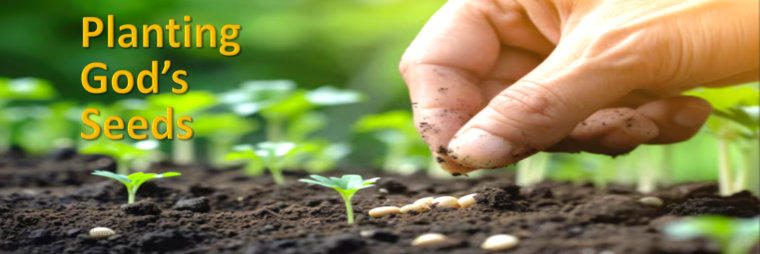
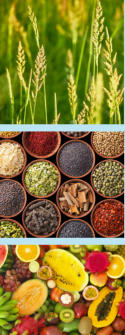


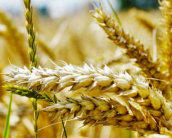



Words of Jesus are in red text.
Hyperlinks = (XXXX…)
Introduction
To
support
human
life,
God
not
only
designed
a
diverse
range
of
plants,
He
also
provided
a
means
for
them
to
reproduce
and
populate
the
earth
by
causing
them
to
generate seeds.
“Then
God
said,
‘Let
the
earth
bring
forth
grass,
the
herb
that
yields
seed,
and
the
fruit
tree
that
yields
fruit
according
to
its
kind,
whose
seed
is
in
itself,
on
the
earth’;
and
it
was
so.
And
the
earth
brought
forth
grass,
the
herb
that
yields
seed
according
to
its
kind,
and
the
tree
that
yields
fruit,
whose
seed
is
in
itself
according
to
its
kind.
And
God
saw
that
it
was
good.
So
the
evening
and the morning were the third day.”
Gen. 1:11-
13
Seed-bearing plants:
•
Are
the
most
diverse
and
widespread
group
in
the
plant kingdom.
•
Have
successfully
populated
the
earth—from
deserts
to rainforests.
•
Fundamentally
support
human
life
by
being
the
main
source of the:
o
Oxygen
we
breath
(via
conversion
of
carbon
dioxide into oxygen).
o
Food
we
eat
(wheat,
rice,
corn,
fruits,
vegetables,
nuts, and so forth).
•
Produce seeds that:
o
Range in quantity from hundreds to thousands.
o
Utilize
various
mechanisms
for
seed
dispersal:
wind, water and animals.
o
Are
able
to
remain
dormant
for
long
periods
of
time
and will germinate when conditions are right.
•
May
exponentially
reproduce
(the
rate
of
growth
increases as quantity grows).
Spiritual Relevance
Jesus
referenced
the
planting
of
seeds
multiple
times
to
explain
spiritual
truths—which
seems
appropriate—because
the
One
who
introduced
plants
on
the
third
day
of
earth’s
creation,
planned
to
implement
a
similar
means
to
expand
and
populate
His
Heavenly
Kingdom
by
casting
His
word
as
“seeds”
that
would
land
upon
and
enter
humans
(via
eyes
and
ears),
germinate
within
the
heart
and
soul,
and
transform
them
so
that
they
may
spread
His
word
as
seeds
to
others.
For
Jesus
declared,
“The seed is the word of God.”
Luke 8:11
When
you
think
about
it,
Christians
are
like
seed-bearing
plants.
Everything
we
say
and
do
has
the
potential
of
landing
upon
and
influencing
others.
In
addition
to
sharing
and
teaching
God’s
word,
examples
of
our
seed
casting activities include how we express:
•
Faith in difficult times.
•
Joy when negative emotions are expected.
•
Kindness with those who are undeserving.
•
Love
when
others
assume
different
types
of
hatred
will be exhibited.
•
Hope when things seem hopeless.
•
Forgiveness for those who are unforgivable.
In
addition,
it
is
important
to
recognize
those
who
publicly
claim
to
be
a
Christian
are
viewed
by
non-Christians
with
a critical eye for one of two purposes—for they are:
•
Looking
for
hypocritical
behavior
as
a
reason
to
reject
God and justify their sin.
•
Seeking
the
existence
of
God
and
His
transformative
truths in the lives of others.
Therefore,
“Let
us
not
love
in
word
or
in
tongue,
but
in
deed
and
in
truth.”
1
John
3:18
And,
“Be
doers
of
the
word, and not hearers only.”
James 1:22
For
we
are
God’s
fellow
workers
and
instruments
of
God’s
Love
as
we
obediently
plant,
water,
and
harvest
(assist
in
the
transformational
born
again
experience)
for
God’s
Kingdom.
Plus,
it
is
a
wonderful
blessing
to
plant
seeds,
water
them
and
facilitate
the
harvest.
However,
one
may
plant,
another
may
water,
and
someone
else
may
harvest.
But
it
is
God
(via
the
Holy
Spirit)
who
is
directly
involved
and
responsible
for
all!
(
1
Cor.
3:5-9;
2
Cor. 9:10
)
Jesus
also
provided
us
with
a
parable
that
provides
spiritual
insight
by
comparing
4
different
soil
conditions
a
seed
may
land
upon—which
correlates
to
the
spiritual
condition
of
the
recipient
of
God’s
seed.
(
Mat.
13:1-23;
Mark 4:1-20; Luke 8:4-15
)
It
is
important
to
note
that
it
is
possible
for
a
seed
to
land
upon
the
wayside
and
remain
dormant
(God’s
word
remains
within
the
heart
and
memory
but
has
not
germinated)—but
the
seed
eventually
moves
to
good
ground
(by
various
means),
germinates
and
produces
fruit
for
God’s
glory.
This
scenario
describes
me
when
I
first
heard
the
Gospel
of
Jesus
Christ.
I
rejected
His
truths
and
continued
to
live
in
darkness
and
sin.
Later
I
encountered
other
persons
who
watered.
But
I
continued
in
my
destructive
path
because
I
was
deceived
by
Satan’s
lies.
Years
later
I
was
at
the
“end
of
my
rope”
and
facing
dire
consequences
for
my
behavior.
The
soil
was
fully
prepared
for
the
seed
of
God’s
word
and
His
truths
to
take
root
in
my
heart
and
grow.
I
vividly
remember
when
the
words
of
Jesus
in
Revelation
3:20
spoke
directly
to
me.
“I
stand
at
your
door
and
knock.
Open
the
door
so
that
I
can
enter
and
dine
with
you,
and
you
with
Me.”
A
couple
of
days
later
I
was
sitting
in
the
back
row
of
a
Christian
church,
and
the
pastor
asked
if
anyone
wanted
to
accept
Jesus
as
their
Savior
and
Lord.
I
remember
my
mind
filling
with
reasons
not
to
go
forward—but
then
realized
this
was
Satan
who
was
unwilling
to
relinquish
control.
I
got
up,
walked
forward
and
stood
before
the
pastor
crying
deep
tears
as
I
declared
my
belief
in
Jesus
and
my
desire
to
accept
Him
as
Lord
over
my
life.
Looking
back...it
was
all
directed
by
the
Holy
Spirit—because
of
the
events
in
my
life
that
caused
me
to
turn
towards
God,
and
through
those
who
planted and watered the seed of God’s word within me.
The Power of God’s Word
God’s word:
•
Operates within the spiritual realm:
o
“For
the
word
of
God
is
living
and
powerful,
and
sharper
than
any
two-edged
sword,
piercing
even
to
the
division
of
soul
and
spirit,
and
of
joints
and
marrow,
and
is
a
discerner
of
the
thoughts
and
intents of the heart.”
Hebrews 4:12
o
“The
words
that
I
speak
to
you
are
spirit,
and
they
are life.”
John 6:63
•
Has
an
intended
purpose:
“So
shall
My
word
be
that
goes
forth
from
My
mouth;
it
shall
not
return
to
Me
void,
but
it
shall
accomplish
what
I
please,
and
it
shall
prosper in the thing for which I sent it.”
Isaiah 55:11
o
Is
the
source
of
guidance
for
those
who
accept
Jesus:
“All
Scripture
is
given
by
inspiration
of
God,
and
is
profitable
for
doctrine,
for
reproof,
for
correction,
for
instruction
in
righteousness,
that
the
man
of
God
may
be
complete,
thoroughly
equipped
for every good work.”
2 Timothy 3:16-17
o
Will
condemn
those
who
reject
Jesus:
“He
who
rejects
Me,
and
does
not
receive
My
words,
has
that
which
judges
him—the
word
that
I
have
spoken
will judge him in the last day.”
John 12:48
Planting the Seeds of God’s Word
Here
are
important
things
to
remember
when
you
share
God’s word:
•
You
are
being
viewed
with
a
critical
eye
that
is
looking
for hypocrisy and/or truth.
•
Evaluate
the
attitude
of
your
heart
and
make
sure
you
share Jesus in the Spirit of God’s grace and His love.
•
Never
speak
words
that
may
convey
your
judgment
or
condemnation (only God has the right to judge).
•
“Avoid
foolish
and
ignorant
disputes,
knowing
that
they
generate
strife.
And
a
servant
of
the
Lord
must
not
quarrel
but
be
gentle
to
all,
able
to
teach,
patient,
in
humility
correcting
those
who
are
in
opposition,
if
God
perhaps
will
grant
them
repentance,
so
that
they
may
know
the
truth,
and
that
they
may
come
to
their
senses
and
escape
the
snare
of
the
devil,
having
been
taken
captive
by
him
to
do
his
will.”
2
Tim.
2:23-
26
•
You
may
encounter
an
objection
expressed
in
various
ways
and
forms.
These
are
not
targeted
at
you,
but
are
the
consequences
of
darkness,
sin
and
lies.
As
such,
“Forgive
them,
for
they
do
not
know
what
they
do.”
Luke 23:34
•
Share the 4 spiritual truths:
1
.
God loves us
and desires a relationship with us.
2
.
We
are
all
sinners
—which
separates
us
from
a
relationship with God.
3
.
God
crucified
His
Son
,
Jesus
Christ,
so
that
we
may be forgiven for our sins.
4
.
We
must
believe
in
what
Jesus
did
for
us
on
the
cross to receive God’s grace and ete
rnal life.
For
more
info
read
“4
Spiritual
Truths”
on UniqueBibleStudies.com
•
Recognize
our
human
intellect
and
pseudo
“wisdom”
is ineffective in the spiritual realm.
•
Pray and ask the Holy Spirit for help.
•
Remember:
o
God’s
word
will
pass
through
listening
barriers
and
reach the depths of the heart and soul.
o
It
is
the
Holy
Spirit
who
saves
a
person
and
not
us.
We a
re simply God’s “farmers.”
“Therefore,
my
beloved
brethren,
be
steadfast,
immovable,
always
abounding
in
the
work
of
the
Lord,
knowing
that
your
labor
is
not
in
vain
in
the
Lord.”
1
Cor.
15:58
“Therefore
be
patient,
brethren,
until
the
coming
of
the
Lord.
See
how
the
farmer
waits
for
the
precious
fruit
of
the
earth,
waiting
patiently
for
it
until
it
receives
the
early
and
latter
rain.
You
also
be
patient.
Establish
your
hearts,
for
the
coming
of
the
Lord
is
at
hand.”
James
5:7-
12
“The
harvest
truly
is
great,
but
the
laborers
are
few;
therefore
pray
the
Lord
of
the
harvest
to
send
out
laborers into His harvest.”
Luke 10:2
“Do
you
not
say,
‘There
are
still
four
months
and
then
comes
the
harvest’?
Behold,
I
say
to
you,
lift
up
your
eyes
and
look
at
the
fields,
for
they
are
already
white
for
harvest!
And
he
who
reaps
receives
wages,
and
gathers
fruit
for
eternal
life,
that
both
he
who
sows
and
he
who
reaps
may
rejoice
together.
For
in
this
the
saying
is
true:
‘One
sows
and
another
reaps.’
I
sent
you
to
reap
that
for
which
you
have
not
labored;
others
have
labored,
and
you have entered into their labors.”
John 4:35-38
We
Serve
A
Wonderful
God—With
Whom
We
Will
Spend
Eternity!
Harold D. Thomas
Thought Provoking Questions
The
purpose
of
the
questions
is
to
facilitate
a
deeper
understanding
of
the
Bible,
this
Bible
study
topic,
and
ourselves.
The
questions
may
be
answered
by
each
reader,
or
used
by
a
Bible
study
group
leader
or
church
pastor.
The
questions
are
designed
to
enhance
learning
by
discovering
and
solidifying
personal
beliefs
and
opinions.
As such, no answers are provided.
First read the following scripture:
The Parable of the Wheat and the Tares
“Another
parable
He
put
forth
to
them,
saying:
‘The
kingdom
of
heaven
is
like
a
man
who
sowed
good
seed
in
his
field;
but
while
men
slept,
his
enemy
came
and
sowed
tares
among
the
wheat
and
went
his
way.
But
when
the
grain
had
sprouted
and
produced
a
crop,
then
the
tares
also
appeared.
So
the
servants
of
the
owner
came
and
said
to
him,
‘Sir,
did
you
not
sow
good
seed
in
your
field?
How
then
does
it
have
tares?’
He
said
to
them,
‘An
enemy
has
done
this.’
The
servants
said
to
him,
‘Do
you
want
us
then
to
go
and
gather
them
up?’
But
he
said,
‘No,
lest
while
you
gather
up
the
tares
you
also
uproot
the
wheat
with
them.
Let
both
grow
together
until
the
harvest,
and
at
the
time
of
harvest
I
will
say
to
the
reapers,
‘First
gather
together
the
tares
and
bind
them
in
bundles
to
burn
them,
but
gather
the
wheat
into
my barn.’”
Matthew 13:24-30
The Parable of the Tares Explained
“Then
Jesus
sent
the
multitude
away
and
went
into
the
house.
And
His
disciples
came
to
Him,
saying,
‘Explain
to
us
the
parable
of
the
tares
of
the
field.
He
answered
and
said
to
them:
‘He
who
sows
the
good
seed
is
the
Son
of
Man.
The
field
is
the
world,
the
good
seeds
are
the
sons
of
the
kingdom,
but
the
tares
are
the
sons
of
the
wicked
one.
The
enemy
who
sowed
them
is
the
devil,
the
harvest
is
the
end
of
the
age,
and
the
reapers
are
the
angels.
Therefore
as
the
tares
are
gathered
and
burned
in
the
fire,
so
it
will
be
at
the
end
of
this
age.
The
Son
of
Man
will
send
out
His
angels,
and
they
will
gather
out
of
His
kingdom
all
things
that
offend,
and
those
who
practice
lawlessness,
and
will
cast
them
into
the
furnace
of
fire.
There
will
be
wailing
and
gnashing
of
teeth.
Then
the
righteous
will
shine
forth
as
the
sun
in
the
kingdom
of
their
Father.
He
who
has
ears
to
hear,
let
him
hear!’”
Matthew 13:36-43
Note:
Tares
(grown
from
the
dar
nel
seed)
is
a
weed
grass
that
looks
like
(and
grows
amongst)
wheat.
Darnel
seeds
are
poisonous
and
mind-
altering;
and
can
cause
nausea,
dizziness
and
other
toxic
effects,
including death.
Questions
Who
is
spiritually
responsible
for
sowing
wheat
seeds
and tare seeds?
Does
the
coexistence
of
wheat
and
tares
spiritually
exemplify what has occurred throughout time?
Is
it
possible
to
correlate
the
consumption
of
darnel
seeds to the consequences of sin? Explain.
Why
do
you
think
the
owner
(God)
wants
the
tares
to
remain until the harvest?
•
If
Satan’s
influence
upon
earth
is
removed
and
there
are no more tares...to what degree would we still:
o
Need to place our faith in Jesus?
o
Love God?
•
Does
God
use
Satan
and
his
minions
to
accomplish
His will upon earth? Explain.
Click
the
hyperlink
to
read
7
verses
on
overcoming:
(
Rev.
2:7, 11, 17, 26; Rev. 3:5, 12, 21
).
•
What does it mean to overcome?
•
What
are
the
eternal
benefits
that
Jesus
declared
are
for those who overcome?
Click
the
hyperlink
to
read
(
Revelation
20:
11-15
).
What
are the eternal consequences for the “tares.”
What
is
the
most
important
thing
you
have
learned
from
this lesson?
You
may
download
a
P
DF
version
of
the
questions
by
clicking on this button.




